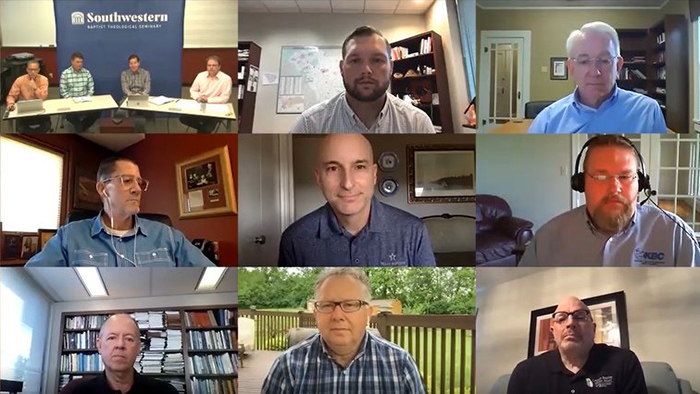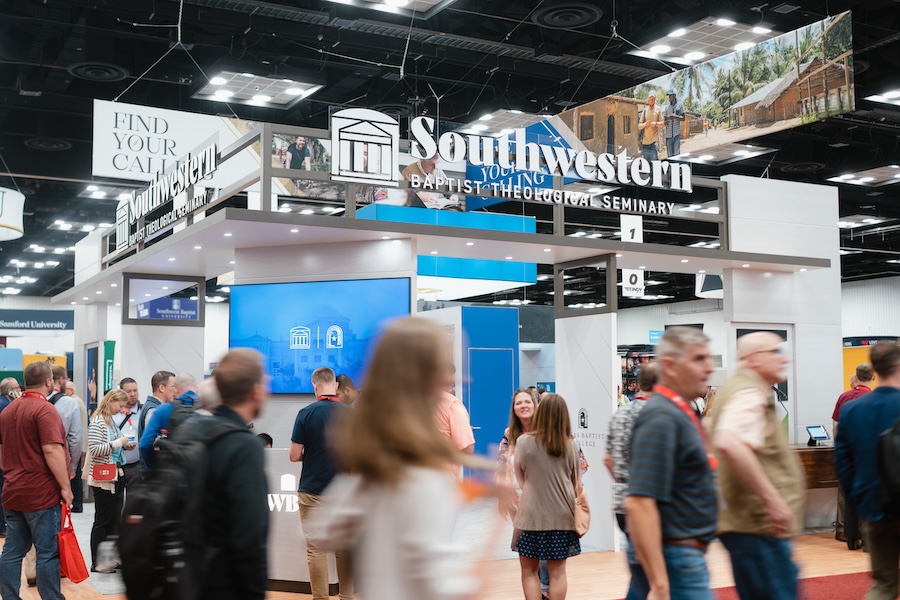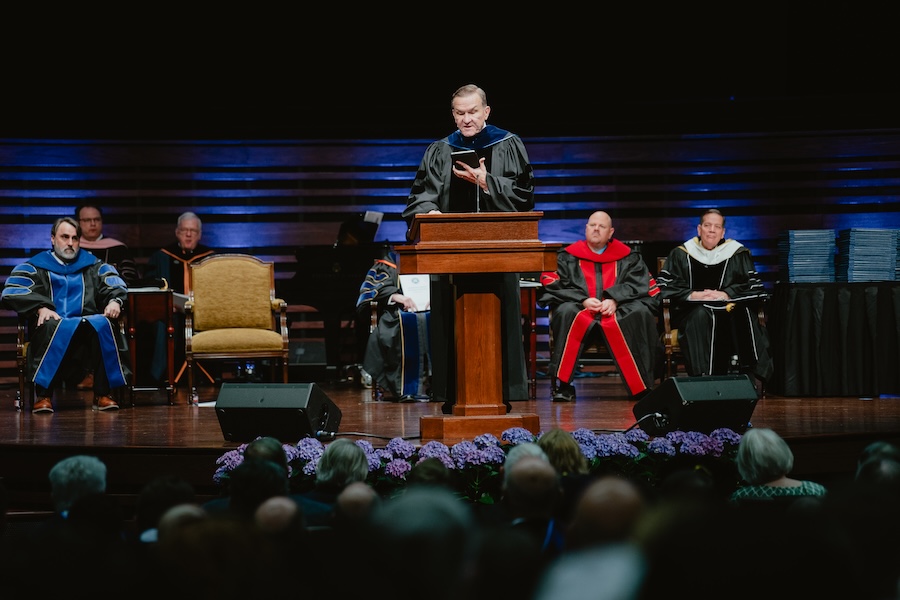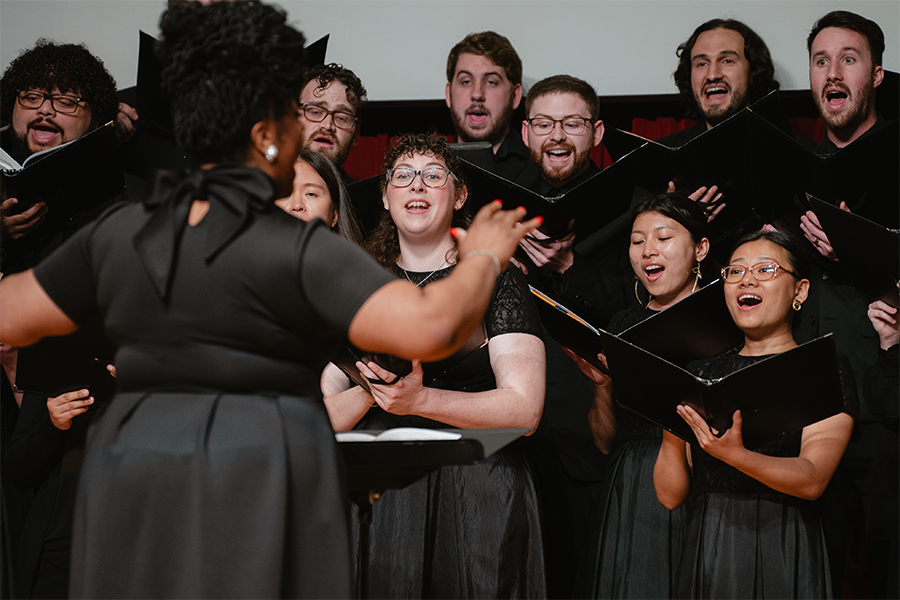Baptist worship leaders discuss ministry during pandemic, strategies for reopening

The Southwestern Baptist Theological Seminary’s School of Church Music and Worship brought together more than 400 worship leaders across the nation in a May 29 webinar to hear faculty and state worship leaders discuss strategies for reopening in-person worship and related concerns.
As churches begin to consider when and how they will welcome people back to their church facilities in the coming weeks, music ministers face a lot of questions and concerns regarding how they lead their people in worship. The “Worship Ministry in a Pandemic” webinar featured four Southwestern Seminary faculty and 10 state convention worship leaders and consultants offering leadership perspectives.
Joseph R. Crider, dean of the School of Church Music and Worship, acknowledged the sudden disruption to normal rhythms and the need to quickly adapt has challenged music ministers. But, Crider added, they must remember the One who will carry them through this season.
“Brothers and sisters, I just want to say for those of you who are tired, weary, and worn out and ready for this to be over, you are in good company,” Crider said. “We have a loving, triune God who gets it, who gets our weariness. We have One in heaven who is not only an almighty Savior, but a most understanding and a feeling friend. We can trust Him with every aspect of our lives with an unhesitating confidence.”
Discussing how health and safety restrictions and guidelines will continue to alter how churches worship together, David Manner, associate executive director for the Kansas-Nebraska Convention of Southern Baptists, said the need to worship from home has impacted his view of corporate worship, reminding him of essentials: the value of inter-generational worship, simplified but meaningful worship, and less contrived music.
“We were forced to worship intergenerationally at home,” Manner said. “We did it because we cared more about taking care of our families than we did about guarding preferences. So every generation was willing to sacrifice something during this season for the good of all.”
Some panelists also discussed guidelines for reopening, including the timing and logistics of how churches can safely gather. Southwestern Seminary’s Campus Clinic Director Richard Knight, M.D., and other panelists affirmed the importance of balance and listening to guidelines from national, state, and local authorities concerning medical considerations.
Matt Freeman, associate director of worship and discipleship for the South Carolina Baptist Convention, discussed how churches who operate in varying contexts must take a balanced approach.
“One of the best ways to approach all of this is to have a comprehensive view of all the news and try to view that through the lens of the Gospel,” Freeman said. “Meaning, we don’t ignore the facts and information, and we also respond to those facts and information with faith and trust and hope, because that’s what we do as Christians.”
Freeman added that it is important for churches and their leaders to seek wisdom and discernment, while aiming to approach such matters with a well-balanced view, honoring the Lord in their actions.
“One of the things we’ve been trying to talk about in South Carolina is trying to find alignment where we have sources of information,” Freeman said, referencing the varying guidelines from sources at the national, state, and local levels. “Where there seems to be alignment of thought, I believe that’s the wisest, clearest path forward.”
Concluding the webinar, panelists offered words of encouragement to leaders and music ministers.
Tom Tillman, director of music and worship for the Baptist General Convention of Texas, encouraged pastors to make the most of every circumstance.
“We have focused so much in the past three months on what we can’t do that I think the enemy has been successful on overshadowing what we can do,” Tillman said.
Tillman’s encouragement to pastors and worship leaders is “to simply turn off the noise.”
“I think the thing we have to realize is that social media and the 24/7 news cycle can have a devastating effect on our minds and our mindsets if we don’t discipline ourselves to set boundaries and parameters for news and social media,” Tillman said, explaining that the people of their churches are watching their examples of response to crisis. “So as worship pastors, we have to focus our minds on the things above and help as we lead others in worship.”
Jason Stewart, worship and music consultant for the Kentucky Baptist Convention, reminded ministers of the resources available from their state conventions and organizations.
“You are not alone in this,” Stewart said. “You have a state music representative and consultant that is here to help encourage you along the way if you find yourself in a position where you’re looking for some answers.”
Additionally, the School of Church Music and Worship has gathered various resources on its Artistic Theologian website.
Other panelists included Chuck Lewis, associate dean of the School of Church Music and Worship; Scott Aniol, associate professor of church music and worship; Ben Caston, associate professor of voice; Jon Duncan, worship catalyst for the Georgia Baptist Mission Board; Slater Murphy, director of church music for the Mississippi Baptist Convention Board; Keith Chandler, statewide consultant for the Georgia Baptist Mission Board; Kenny Lamm, senior consultant for the Baptist State Convention of North Carolina; Randy Lind, worship and music specialist for the Baptist General Convention of Oklahoma; and Dwayne Lee, associate resource group leader for the State Convention of Baptists in Ohio.
To view the entire webinar, see here.



